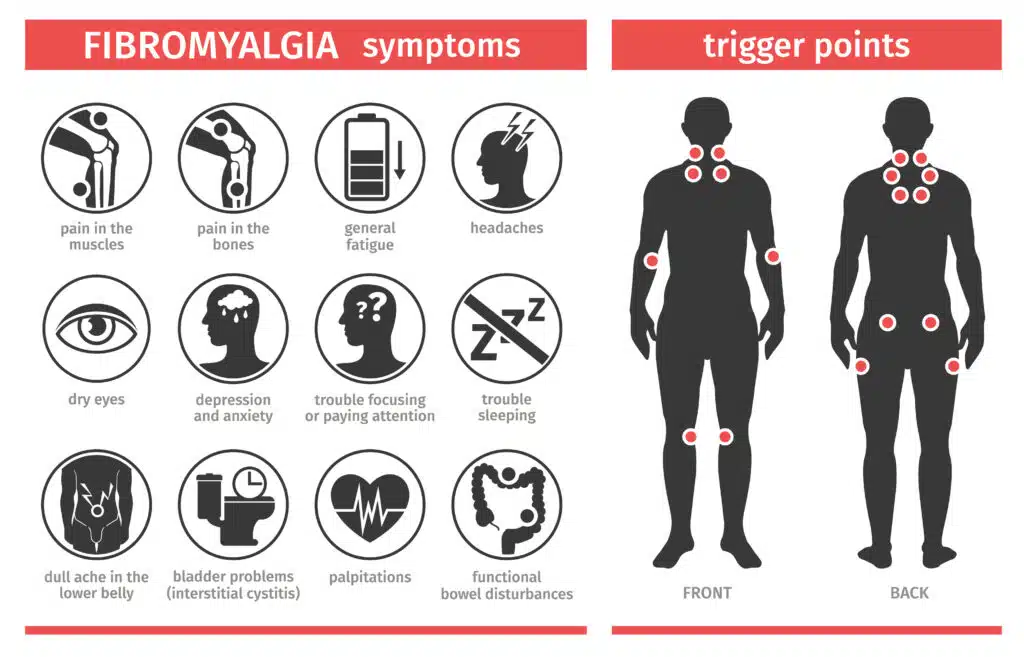
This post discusses Fibromyalgia and Social Security Disability Benefits. If you are unable to work due to Fibromyalgia, read on.
The Bishop Law Firm has represented Social Security Disability clients since 2013.
Attorney Kimberly Bishop, of The Bishop Law Firm, is a NC Board Certified Social Security Disability Lawyer in Raleigh, NC who has practiced disability law since 2009.
In addition, Chasity Everett, EDPNA, also represents disability clients for the firm and has worked with disabled clients since 2002 (Read more about The Bishop Law Firm).
We offer free case reviews and there are no fees unless you win.
What is Social Security Disability?
If you are unable to work because of your health, Social Security offers two main types of disability benefits that you can apply for. Social Security Disability Insurance Benefits and Supplemental Security Income each have their own unique application requirements and you will need to be found disabled under SSA's Five Step Sequential Evaluation before you are entitled to either benefit.
Social Security Disability Insurance (SSDI)
SSDI (Social Security Disability Insurance) is based on the credits from the work you have done in your life. You must be found disabled before your date last insured (DLI) to be found eligible for SSDI. Your DLI is calculated by counting your “quarters of coverage” from your earnings record. You must have 20 “quarters of coverage” of the last 40 quarters. Simply put, you must have worked 5 years of the last ten years (in general). In addition, Adult Disabled Children can be eligible for disability benefits off their parent’s account.
Supplemental Security Income (SSI)
SSI (Supplemental Security Income) is a need-based program and you must meet income/asset standards in addition to being found disabled under the five steps above. In 2024, SSI is $943 a month for an individual and $1,415.00 for an eligible couple. SSI will be reduced by 1/3 if you are receiving financial help from others. In NC, SSI recipients are also entitled to Medicaid.
If your Fibromyalgia symptoms have stopped you from working, file for Social Security Disability as soon as possible. Delay may cause you to lose benefits.
What is Fibromyalgia?
Fibromyalgia causes widespread musculoskeletal pain accompanied by fatigue, sleep, memory and mood issues. Researchers believe that Fibromyalgia amplifies painful sensations by affecting the way your brain processes pain signals (Via the Mayo Clinic).
Chronic pain onset can be immediate (after trauma) or gradual with no precipitating event.
Diagnosing Fibromyalgia can be difficult as there can be significant symptom overlap with many other disorders: Lupus, Multiple Sclerosis, Rheumatoid Arthritis, Polymyalgia rheumatica, Axial Spondyloarthritis, Thyroid disease, Type 2 Diabetes, Anemia or Chronic Fatigue Syndrome (Via CreakyJoints.org).
To complicate diagnosis further, Fibromyalgia can co-occur with other disorders (irritable bowel syndrome and anxiety are two examples). The first step in feeling better is determining if Fibromyalgia is truly the cause of your pain.
Also see our posts on Lupus, Multiple Sclerosis, Rheumatoid Arthritis, Autoimmune Disease, Diabetes, Digestive Disorders and Anxiety
If you are being treated for a disorder (like those mentioned above that mimic Fibromyalgia) or being treated for Fibromyalgia but you are not improving, talk to your doctor about differential diagnoses.
Fibromyalgia has historically been diagnosed by eighteen tender points on a person's body (See image below). There is a base level of pain which can be exacerbated when clients have a flare. A flare can last for a day or a month (or longer).

However, there is a blood test now available for diagnosing Fibromyalgia (FM/a). In order to take this test, a patient must stop taking immune system altering medications for 14 days prior to testing and it may not work for everyone, but it's a step in the right direction!
Many clients with Fibromyalgia have described their pain to me as flu like muscle ache that is worsened by activity, stress and sometimes even being touched.
Rheumatologists usually recommend stress reduction, exercise, relaxation or medication as ways to alleviate your Fibromyalgia pain. If you have followed your doctor's advice regarding your Fibromyalgia but your symptoms still keep you from working, you may need to consider filing a claim for Social Security Disability.
Unfortunately, there are some doctors who still do not believe that Fibromyalgia exists despite all evidence to the contrary. If your doctor falls in this category, you may want to get a 2nd opinion.
Social Security Disability Benefits for Fibromyalgia
Fortunately, the Social Security Administration has recognized that Fibromyalgia can be a severe impairment in SSA Ruling 12-2p.
Social Security Ruling 12-2p: Titles II and XVI: Evaluation of Fibromyalgia requires:
- A diagnosis of Fibromyalgia by an acceptable medical source (a licensed physician) that is based on medical records and physical findings. SSA specifically notes that "we cannot rely upon the physician's diagnosis alone." The medical records and physical findings must demonstrate:
- A history of widespread pain that has persisted for at least 3 months
- At least 11 positive tender points on physical exam bilaterally
- Evidence that other disorders that could cause symptoms were excluded
12-2p sets the stage for Social Security to accept your Fibromyalgia as a "medically determinable impairment" and thus a severe impairment.
Once your Fibromyalgia has been established as a severe impairment, you have completed Step 2 & 3 of SSA's Five Step Sequential Evaluation to determine if you are disabled:
- Step 1 – Are You Working? The Social Security Administration defines work as “Substantial Gainful Activity” (SGA). SGA is roughly defined as work from earnings that average more than $1,550 (2024) a month. If you are making that amount you generally will not qualify for disability.
- Step 2 – Is Your Condition “Severe”? Severity is key when it comes to what qualifies as a disability. Severe is defined by the Social Security Administration as: your condition must interfere with basic work-related activities for your claim to be considered. (THE ABOVE 12-2P IS USED TO DETERMINE IF FIBROMYALGIA IS A SEVERE IMPAIRMENT).
- Step 3 – Is Your Condition on the List of Disabling Conditions? The Listings are very hard to meet in most cases and not always interpreted as a common reading would suggest. If you meet a listing you are gravely ill. The listings are found here. (THERE IS NO LISTING FOR FIBRROMYALGIA SO THIS STEP IS SKIPPED IF FIBROMYALGIA IS YOUR ONLY IMPAIRMENT). (RFC is also determined here before moving to Step 4).
- Step 4 – Can You Do the Work You Did Previously? The Social Security Administration will look at your past work and determine if it was sedentary, light, medium, or heavy. They also will evaluate the skill level: unskilled, semi-skilled and skilled. For instance, an attorney would be sedentary skilled work. The Dictionary of Occupational Titles is found here.
- Step 5 – Can You Do Any Other Type of Work? If the Social Security Administration finds that you cannot do what you used to do, they then look to see if you can do anything else. This is where the “grids” come into play. The grids are the Medical-Vocational Guidelines. The grids are only for exertional impairments. Non-exertional impairments are not considered by the grids. If you are found to be capable of any other work, you will be found not disabled. Read The Grids and Your Social Security Disability Case.
Prior to moving to Step 4 above, SSA will create a residual functional capacity (RFC) for you. The RFC is the "most you can still do despite your limitations." The affect that Fibromyalgia has on your ability to work must be considered by the Social Security Administration when they develop your RFC.
Despite having an accurate diagnosis of Fibromyalgia and following all medical advice, a common example that I hear from my clients is that one day of even moderate exertion can result in severe pain and the need to rest for several days to recover. During this required rebound, an individual would not be able to work. This would result in excessive absenteeism and that is not conducive to maintaining employment.
Pain, medication side effects, and mental components of Fibromyalgia should all be considered by SSA when determining if a person can work.
Also, as discussed above, Fibromyalgia frequently co-occurs with other disorders. If you have been diagnosed with multiple disorders, SSA will need to evaluate the combination of your impairments (and all your symptoms) to determine your RFC.
Also read Social Security Disability Conditions
Do you need a Social Security Disability Lawyer?
Fibromyalgia cases can be difficult to win even with the proper documentation. The real question (as always with SSA) is how does your Fibromyalgia affect you (and thus your ability to work)?
Clients with Fibromyalgia frequently have to have a hearing before an SSA Administrative Law Judge in order to attain disability benefits. In the disability process, the hearing is where you have the best statistical chance of attaining disability benefits for fibromyalgia.
Objective medical evidence and all symptoms (chronic widespread pain, chronic fatigue, memory problems, fibro fog, sleep problems, muscle weakness and any other symptoms) must be discussed with the Administrative Law Judge.
Disability attorneys can help demonstrate to SSA how your Fibromyalgia has changed your life and eliminated your ability to work in terms that SSA can use to make the right decision on your disability claim.
We represent Social Security Disability clients in Raleigh, Durham, Fayetteville, Cary, Rocky Mount, Wilson, Smithfield, Louisburg, Chapel Hill, Roanoke Rapids , Winston Salem, Garner, Greensboro, Greenville and surrounding areas in North Carolina. Call us today for a free case review, (919) 615-3095 or start online now.

